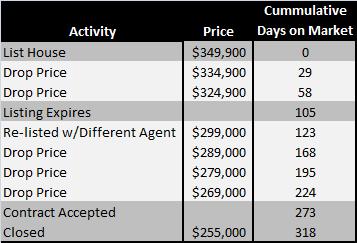When the real estate market slows and inventory grows, setting the listing price of a home becomes critically important. “Chasing the market” is a situation no homeowner wants to be in, but many set themselves up for this everyday.
Think about it. People hire real estate agents to help them price, market, and sell their homes. Why is it that so many homeowners disregard their agent’s pricing advice, which is based on hard sales data, and determine their own value of the home? The homeowner’s value is usually based on “gut feel” rather than real data and current competition.
Is it emotional attachment?
Is it distrust for the agent?
Is it greed?
I’m guessing it’s a combination of all three reasons (plus maybe a few more). But if homeowners could understand the value they are actually losing by ignoring pricing advice, maybe they would think twice before overpricing.
So, let’s look at a telling example of Chasing the Market that recently occurred in West Hartford.

The owner ended up doing 6 price reductions before their house sold!
This house was on the market for slightly more than 9 months and sold for 72.8% of it’s original list price. The average sale-to-list price ratio for West Hartford’s 2007 real estate market was 97.2%.
My best estimate of where this house should have started was $310,000. It was approximately $40,000 overpriced from the start. If the house sold at 97.2% of its asking price, West Hartford’s average, it would have closed at $301,320. Effectively, this homeowner lost $46,320 because they chose to overprice and ended up chasing the market.
Add to this the constant annoyance of having their house shown for 8 months with no offer and the emotional distress of wondering why no one wanted to buy their house. Ugh.
Moral of the story: Trust your agent’s advice when they present you with sales data from truly comparable homes. If you don’t trust your agent’s advice, talk to a few others. Their prices should triangulate within a reasonable range. From there, the emotion will be taken out of your decision and you’ll truly know where to start.